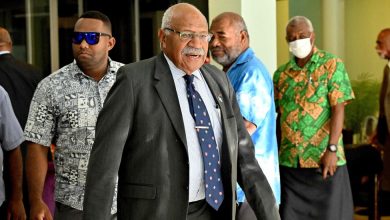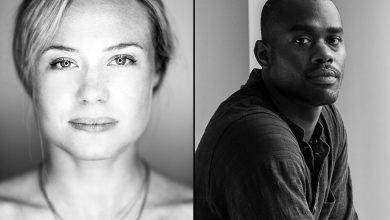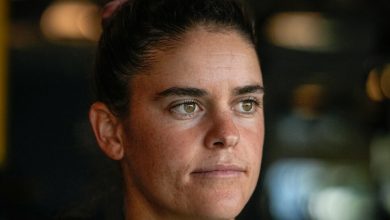A Pandemic Plan Boomerangs, So It’s Back to Hell’s Kitchen

Jane Riley thought it was time to go home.
Originally from Australia, she moved to the United States in 1984, several years after meeting a handsome American Marine named Rex Riley.They enjoyed 34 years of marriage until Mr. Riley died suddenly in 2003. After his death, Ms. Riley stayed in the country and settled in New York, near one of her two grown sons, but early in the pandemic she felt like a return to Australia was in order.
She owns an apartment in Sydney. It has views of the harbor and the Opera House. She and her husband bought the place together, but two weeks before they were planning to fly to Australia and see it for the first time, Mr. Riley went for a jog and collapsed. As the pandemic deepened in the summer of 2020, Ms. Riley, who is 80, felt the pull of “The Lucky Country.” She was missing her other son, who works at a bank in Melbourne, and her grandchildren whom she hadn’t seen since “the before times.”
Before she left for Australia, her New York apartment was in Hell’s Kitchen on the 39th floor of a doorman building with a pool and a gym. It was a rare one-bedroom with two bathrooms — a bathtub in one and a walk-in shower in the other. “I know,” she said, “very lucky.” She had 180-degree views from the Hudson River to Times Square. It was a comfortable, beautiful place and she enjoyed all 13 years that she lived there.
But Ms. Riley believed the next stage of her life was in Australia.
So Ms. Riley flew to the state of Victoria to visit with her son and his family. The plan was to spend some time near Melbourne then make her way to the apartment in Sydney and start reconnecting with old friends.
None of that happened.
Upon arrival she went into mandatory quarantine in a designated hotel — at her own expense. Soon thereafter, a member of her son’s family contracted Covid, which complicated her departure from the hotel.
She wasn’t able to see her grandchildren as much as she hoped — her son and his partner were keeping up with work, keeping up with life in their crowded home, and there were tight restrictions on how much anyone could travel. In most cases, no one was allowed to venture more than three miles from home and fines could be high.
There wasn’t much available to Ms. Riley in the immediate area of her hotel and relocating to the Sydney apartment, in the next state over, wasn’t an option. Like in the United States, many of the Covid restrictions in Australia are determined by the states, and most didn’t permit interstate travel at the time, which meant that Ms. Riley was largely confined to Victoria.
She ended up living in the hotel for 17 months. An uncle died, then an aunt, but she couldn’t travel to see either before they passed.
“I did try to settle back in Australia,” she said, “but I’m sorry, it just didn’t work. I had to reckon with that and it wasn’t easy.”
Soon she decided to return to New York — but even that would be difficult.
To leave Australia, Ms. Riley needed permission because the government wasn’t allowing citizens to leave the country. She hoped she’d be an obvious candidate for an exemption because she has dual citizenship between Australia and the United States — and she was making clear her intention to stay in New York.
Still, her request was denied.
The primary concern, she was told, was that she might return, despite her intentions, and bring Covid with her. “I thought to myself,” she said, “‘The way you are treating me I wouldn’t want to come back — ever.’”
She called the American consulate for help but didn’t get anywhere. She decided to apply for an exemption again, this time with more proof of her life in New York. The first application included 10 supporting documents; the next application would have 25. Why 25? “Because that’s the max,” she said.
$3,800 | Hell’s Kitchen
Jan Riley, 80
Occupation: Retired teacher
On Writing Love Letters: Ms. Riley and her late husband, Rex, met on his seven-day U.S. military “R & R” trip to Australia. Afterward, they began an epistolary relationship, which was somewhat lopsided: “He wrote me 169 letters, but I only wrote 45 because my grandmother always taught me to never put anything in writing,” Ms. Riley said, laughing.
On Teatime: Ms. Riley, an avid tea drinker, remembers how her husband often made a cup for her. “We went through a program and answered some questions before we got married,” she said. “The guy who took my answers said to Rex, ‘My word of advice: When she loses it, just make her a cup of tea and she’ll be right.’ And he did, and I was.”
Working with Ross, her son in New York, she secured copies of old leases and bank statements, and sent everything off. Two weeks later she received official word that she could leave the country. “If it wasn’t for Ross,” she said, “I’d still be sitting in Australia. I knew people who had applied three or four times and got knocked back each time.”
Ms. Riley still remembers that moment she returned to New York and stepped out of the airport: “The first words out of my mouth were, ‘I’m free.’ I saw people walking around, I saw people talking, it was incredible. In New York, even though people are social-distancing and wearing masks, you can still go and get a cup of coffee, you can go and eat. In Melbourne, you couldn’t do that.”
Initially, Ms. Riley looked for a place in Sunnyside, Queens, to be near her son and his family, but she was having a hard time finding a place that felt like a good fit. Many of the buildings she saw were older, with stairs, which are getting harder for her to manage.
“We couldn’t find anything,” she said. It was dispiriting. She was looking forward to being near family but it felt like nothing was working out — not her sojourn to Australia, not her return to New York. “I was just feeling so fed up with it all.”
That’s when Ross called. “He said ‘Do you know that your old apartment is available?’”
She went online and, sure enough, there was the listing, the 39th floor one-bedroom where she had moved shortly after losing her husband, with the wraparound views of sunsets and bright lights. Everything was exactly the same — except with a fresh coat of paint. “It was like it was waiting for me,” she said.
Ms. Riley reached out to her old landlord, who, being astute, welcomed back his reliable tenant without hesitating. “That was so nice,” she said. “I didn’t have to battle the owner, proving who I was.”
And so, 17 months later, she returned to her building.
Several of her neighbors recognized her immediately. “Everyone was so welcoming when I came back,” she said. “How many places do you go into in New York where you’re treated that way? Not many.”
She’s almost all moved in — still chasing down some furniture, still navigating global supply chain issues, but she feels comfortable again.
“I told my son, ‘I knew there’s a place for me.’ I just never would have dreamed it would be my old apartment. Maybe it’s about me changing.”
For weekly email updates on residential real estate news, sign up here. Follow us on Twitter: @nytrealestate.





